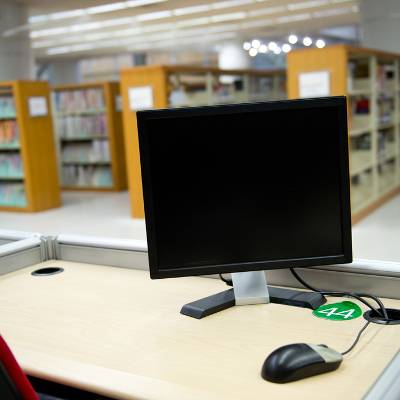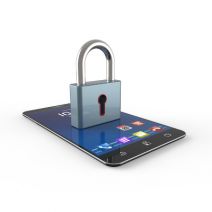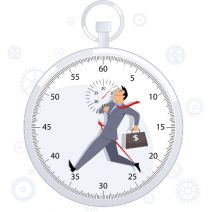Have you ever received unsolicited calls from unknown numbers? Sometimes you might receive them at incredibly inconvenient times, such as while you’re home and trying to wind down after a long day’s work. While Caller ID and voicemail have allowed users to keep unwanted calls to a minimum, there are other ways that you can block a caller entirely from reaching your smartphone.
Macro Systems Blog
Netflix is a great way to keep yourself entertained while on the go, but you can’t take it wherever you want. One great example of such a restriction is while you’re on a flight, where Wi-Fi isn’t permitted (or unnecessarily slow and expensive). Thanks to a couple of innovations implemented by Netflix, you can download videos for offline viewing through its mobile app.
 Public computers are like public restrooms. You really don’t want to use them unless you absolutely have to. Coincidentally, the reason to avoid each public service is the same; viruses--both of the biological and the digital variety. Thankfully, there’s a way to sanitize your data so that you can safely use a public PC.
Public computers are like public restrooms. You really don’t want to use them unless you absolutely have to. Coincidentally, the reason to avoid each public service is the same; viruses--both of the biological and the digital variety. Thankfully, there’s a way to sanitize your data so that you can safely use a public PC.
 While email offers several great benefits to those willing to deal with it, the most popular method of communicating in the office has its flaws. One of the most crippling is spam, which can ruin your inbox and your productivity. The unfortunate truth is that even the most diligent workers get hit with spam, but that doesn’t mean that your business’s productivity needs to suffer from it.
While email offers several great benefits to those willing to deal with it, the most popular method of communicating in the office has its flaws. One of the most crippling is spam, which can ruin your inbox and your productivity. The unfortunate truth is that even the most diligent workers get hit with spam, but that doesn’t mean that your business’s productivity needs to suffer from it.
 It’s a good feeling to have your workstation’s web browser set up exactly how you like it. With all of your favorite websites bookmarked and your most-visited sites quickly appearing in a drop down menu as soon as you type in a letter or two, you’re able to efficiently navigate the Internet and quickly find exactly what you’re looking for. But what happens to your bookmarks when your hard drive crashes?
It’s a good feeling to have your workstation’s web browser set up exactly how you like it. With all of your favorite websites bookmarked and your most-visited sites quickly appearing in a drop down menu as soon as you type in a letter or two, you’re able to efficiently navigate the Internet and quickly find exactly what you’re looking for. But what happens to your bookmarks when your hard drive crashes?
 Today, having a strong WiFi signal is critical. You need a reliable signal for every part of your home, office, and even outside the building. Is your wireless signal strong in some areas and spotty in others? Would your life be immensely easier if your signal extended for just one or two more rooms? For this week’s tip, here’s how you can extend your WiFi signal.
Today, having a strong WiFi signal is critical. You need a reliable signal for every part of your home, office, and even outside the building. Is your wireless signal strong in some areas and spotty in others? Would your life be immensely easier if your signal extended for just one or two more rooms? For this week’s tip, here’s how you can extend your WiFi signal.
 It doesn’t matter how extraordinary your business skills are; eventually, your body begins to catch up with you and you’re hit with a storm of illness that no painkillers or medication can quell. In this case, it’s often better to quarantine yourself to your home and take it easy for the day. But, that doesn't mean that you can’t be productive at the same time.
It doesn’t matter how extraordinary your business skills are; eventually, your body begins to catch up with you and you’re hit with a storm of illness that no painkillers or medication can quell. In this case, it’s often better to quarantine yourself to your home and take it easy for the day. But, that doesn't mean that you can’t be productive at the same time.
 With the new iPhone 6 release just a few short weeks ago, many users are excited to ditch their old devices and get the flexible new piece of hardware. Unfortunately, these users might not take into account that their phones could potentially hold private information which should be deleted before forking over the device.
With the new iPhone 6 release just a few short weeks ago, many users are excited to ditch their old devices and get the flexible new piece of hardware. Unfortunately, these users might not take into account that their phones could potentially hold private information which should be deleted before forking over the device.
 Google is the world's most popular search engine, but sometimes it just can't find exactly what you're looking for. This is because Google utilizes algorithms, which don't crunch data the same way that humans do. What we might think is common sense doesn't qualify for Google. Thankfully, there are several different ways you can narrow down Google's search results.
Google is the world's most popular search engine, but sometimes it just can't find exactly what you're looking for. This is because Google utilizes algorithms, which don't crunch data the same way that humans do. What we might think is common sense doesn't qualify for Google. Thankfully, there are several different ways you can narrow down Google's search results.
 Whether it’s warranted or not, some people are worried about the spread of the Ebola virus. Office employees should also be concerned with the many other cooties that remain on common surfaces. This points to sanitation as a primary issue, especially in public places like your office. Among many other surprising germ-transmitting mediums, like money, cats, and dogs, technology accumulates a lot of ilk which could potentially spread to the entire office… that is, if you’re not careful to nip it in the bud.
Whether it’s warranted or not, some people are worried about the spread of the Ebola virus. Office employees should also be concerned with the many other cooties that remain on common surfaces. This points to sanitation as a primary issue, especially in public places like your office. Among many other surprising germ-transmitting mediums, like money, cats, and dogs, technology accumulates a lot of ilk which could potentially spread to the entire office… that is, if you’re not careful to nip it in the bud.
 If your business were to lose important files due to an unexpected Microsoft Office crash or hardware failure, what would you do? Losing files can be difficult to recover from, especially if you aren’t using a cloud service which saves automatically after every edit. Lost files don’t benefit anyone, and if they are important, it could even put your business at risk. But don’t worry; there’s a way to recover lost Office files if things turn sour.
If your business were to lose important files due to an unexpected Microsoft Office crash or hardware failure, what would you do? Losing files can be difficult to recover from, especially if you aren’t using a cloud service which saves automatically after every edit. Lost files don’t benefit anyone, and if they are important, it could even put your business at risk. But don’t worry; there’s a way to recover lost Office files if things turn sour.
 Microsoft Outlook is a great tool for the everyday businessman, but it can be tricky to use sometimes. Just like Microsoft Word, there are several shortcuts that you can utilize to boost your productivity and reduce the amount of time you spend fumbling around the variety of different options available to you.
Microsoft Outlook is a great tool for the everyday businessman, but it can be tricky to use sometimes. Just like Microsoft Word, there are several shortcuts that you can utilize to boost your productivity and reduce the amount of time you spend fumbling around the variety of different options available to you.
 We all know how annoying email can be at times. Your inbox is constantly being filled with new messages, and before you know it, you have no idea what you've responded to or what needs to be responded to. To make matters worse, the average office worker spends roughly two hours staring at their email inbox and responding to messages. Not only is this counterproductive, but is also a massive time-wasting practice.
We all know how annoying email can be at times. Your inbox is constantly being filled with new messages, and before you know it, you have no idea what you've responded to or what needs to be responded to. To make matters worse, the average office worker spends roughly two hours staring at their email inbox and responding to messages. Not only is this counterproductive, but is also a massive time-wasting practice.
 More studies are proving that multitasking is terrible for productivity. This is due to the fact that the brain just isn't capable of doing two things at once, or at least very well. Instead, behavioral scientist are saying that focusing on a single task is the key to productivity. Here are three tips to help you focus at work!
More studies are proving that multitasking is terrible for productivity. This is due to the fact that the brain just isn't capable of doing two things at once, or at least very well. Instead, behavioral scientist are saying that focusing on a single task is the key to productivity. Here are three tips to help you focus at work!
 Smartphones may have been some of the first Internet-connected mobile devices, but they are still as vulnerable to attack as ever. This is especially true for those who forsake any sort of mobile device security policy. With modern businesses utilizing mobile devices, it’s more important now than ever before to have solid security practices in place.
Smartphones may have been some of the first Internet-connected mobile devices, but they are still as vulnerable to attack as ever. This is especially true for those who forsake any sort of mobile device security policy. With modern businesses utilizing mobile devices, it’s more important now than ever before to have solid security practices in place.
 When it comes down to it, your employees are being paid for their time spent at work. Business operates on the principle of “time is money,” which means that every minute wasted cuts into your bottom line. If you’re looking to squeeze the most productivity out of your employees, then there are technologies available that can take back those precious minutes.
When it comes down to it, your employees are being paid for their time spent at work. Business operates on the principle of “time is money,” which means that every minute wasted cuts into your bottom line. If you’re looking to squeeze the most productivity out of your employees, then there are technologies available that can take back those precious minutes.









